8 Africa
Africa is a continent with immense potential owing to its rich natural resources and large population of approximately 1.3 billion. However, it also faces various challenges including poverty, fragile health systems, and emerging terrorism and violent extremism. In order to tackle these challenges, African countries work on sustainable development based on Agenda 2063, Note 23 Africa’s own new development initiative. Japan has contributed to Africa’s development over many years through the Tokyo International Conference on African Development (TICAD)* and other efforts.
● Japan’s Efforts
COVID-19 has seriously affected economies and societies in Africa. In order to prevent the spread of COVID-19 infections and address its economic and social impacts, Japan has provided various support to African countries, including the provision of health and medical equipment for the development of cold chains, Note 24 etc., both bilaterally and through international organizations. In addition, Prime Minister Kishida stated in December 2021 that Japan would donate approximately 10 million doses of vaccines to Africa.
Looking ahead to TICAD8, which is scheduled to be held in 2022, Japan is actively engaged in various development issues in Africa that have been brought to light by the COVID-19 pandemic (see “Master Techniques from Japan to the World 2” and “Master Techniques from Japan to the World 4” for non-revenue water measures in Malawi and joint research on community-driven co-creation of forest resource management in Cameroon, as well as “Project Introduction Columns” on Ethiopia, Mali, Nigeria, and Uganda, and on Ghana for initiatives to increase the resilience of African agriculture utilizing ICT technology and to establish Child Labor Free Zones in Ghana).
■ Economy
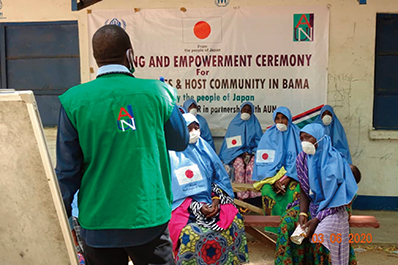
Internally displaced women receiving vocational training in northeastern Nigeria (Photo: UNHCR)
In order to realize quality growth, Japan develops industrial human resources who will contribute to the promotion of businesses, including through the ABE Initiative 3.0, Note 25 and provides training opportunities to approximately 1,600 young Africans through JICA (see also “Japan’s Efforts toward the Post-COVID-19 Era” for activities of ex-participants of the ABE Initiative). Japan also promotes quality infrastructure investment centered on the three priority areas Note 26 toward enhancing connectivity (see also Part II, 1 “(1) Development of Industrial Infrastructure and Industries and Economic Policy” and “(4) Vocational Training, Industrial Human Resources Development, and Employment Creation” for specific initiatives by Japan. See “Stories from the Field 6” for Japan’s support for the Rwanda-Tanzania road improvement project and facilitation of border procedures).
■ Society
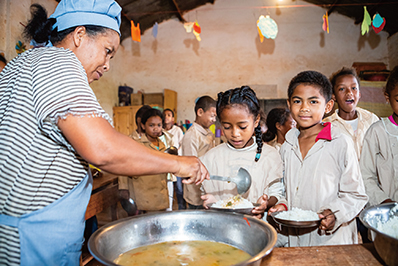
A parent volunteer in Madagascar serving school lunches as part of the “School for All” project supported by Japan (Photo: JICA)
In order to further promote measures toward the expansion of UHC, which was announced at TICAD7, Japan is engaged in the improvement of access to basic healthcare and hygiene environments for three million people and the promotion of the health insurance system. Currently, Japan contributes to the promotion of UHC including through the “Health Sector Policy Loan for Attainment of the UHC (Phase 2)” in Kenya and the “Project for Universal “Nutrition” and Health Coverage through Sustainable Systems for Nutrition Improvement (in Cooperation with WFP)” in Ghana (see also Part II, “3 Promoting Efforts to Address Global Issues and Human Security” for specific efforts by Japan, and “Project Introduction Columns” on Zambia and 30 African Countries for hospital upgrading in Zambia and the Stop TB Partnership’s efforts in 30 African countries).
Through TICAD, which has over a quarter of a century of history, Japan has been focusing on the promotion of health as one of the priority areas and supporting the health and medical systems in Africa. Such assistance Japan has provided so far is demonstrating its true value in the COVID-19 pandemic. (see also “Japan’s Efforts toward the Post-COVID-19 Era” for the activities of a research center in Gabon supported by Japan during the pandemic). Japan will continue to play a leading role in strengthening international collaboration in the health sector in Africa based on its longstanding efforts in this area.
In addition, Japan is proceeding with efforts to provide quality education to three million children through the expansion of math and science education and improvement of learning environments.
■ Peace and Stability
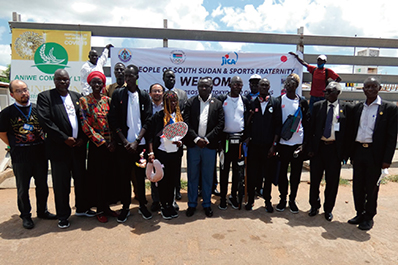
Athletes after returning to South Sudan from Japan
Under the New Approach for Peace and Stability in Africa (NAPSA)* advocated by Japan at TICAD7, Japan has provided support for Africa-led efforts for conflict resolution, as well as assistance for institution building to address the root causes of issues such as conflict and terrorism. As a part of this initiative, Japan has provided support of over $110 million since 2008 to implement projects that have benefitted peacekeeping training centers in 15 African countries. Japan has also dispatched approximately 60 Japanese lecturers to strengthen the training capabilities of the facilities and provide training at the facilities.
In response to the large number of casualties and displaced persons caused by the military engagement in northern Ethiopia in 2020, Japan decided in February 2021 to extend $6.6 million (approximately ¥726 million) in Emergency Grant Aid for internally displaced persons in the Tigray Region of Ethiopia. Japan provided humanitarian assistance in the medical field, provision of relief items such as food and hygiene products through WFP, IOM, UNICEF, UNHCR, the United Nations Office for the Coordination of Humanitarian Affairs (OCHA), and the International Committee of the Red Cross (ICRC). Furthermore, in December, as Emergency Grant Aid of $12.4 million (approximately ¥1.3392 billion), Japan decided to provide support, including food and other relief items, to internally displaced persons in the Afar, Amhara, and Tigray regions in Northern Ethiopia through the UNHCR, WFP, IOM, and United Nations Mine Action Service (UNMAS).
In the Sahel region, Japan contributes to the peace and stability of the region under the banner of NAPSA by providing equipment for strengthening capacity for maintaining security, training for people engaging in institution building, vocational training and education opportunities for the youth, as well as support for human resources development for peacekeeping operations, placing its focus on the administrative vulnerabilities of Sahel countries. Japan also continues its assistance for refugees, internally displaced persons and host communities in the region.
In Cabo Delgado Province of Mozambique, where the situation has been unstable for several years, the security situation has been improving since the summer of 2021 as the Southern African Development Community (SADC) and Rwandan security forces have been engaged in operations to eliminate terrorists. In August 2021, Japan signed the Exchange of Notes for grant aid for the provision of patrol vessels in order to strengthen the enforcement against drug trafficking and illegal fishing, which are challenges that the Government of Mozambique faces in the province. Also in 2021, Japan continued to provide food assistance through WFP and humanitarian assistance to displaced persons in vulnerable situations (see “Japanese Personnel at International Organizations Playing Active Roles on the Front Lines across the World amid the COVID-19 Pandemic,” Ms. HIROTA Miwako and Ms. ODASHIRO Keiko, who work in Mozambique).
Since the independence of South Sudan in 2011, Japan has supported its nation-building. Since November 2011, the Ministry of Defense and the Self-Defense Forces have dispatched Staff officers and an engineering unit to the United Nations Mission in the Republic of South Sudan (UNMISS) (Activities of the engineering unit ended at the end of May 2017).
Japan also supports South Sudan’s own initiatives for the peace process including through the Intergovernmental Authority on Development (IGAD), a regional organization of East Africa. Along with the support for infrastructure development, human resources development, and food assistance, Japan has played a major role in the consolidation of peace and economic stabilization in South Sudan.
Moreover, Japan has supported the holding of the National Unity Day sports event, which is held annually by the Ministry of Culture, Youth and Sports of South Sudan, since it began in 2016 in order to promote the reconciliation, friendship, and unity of its citizens. Four athletes who had participated in the event joined a long-term pre-Olympics camp in Maebashi City with the aim of competing in the Tokyo 2020 Olympic Games, and two of them qualified for the track and field events of the Games. The strong performance of these two athletes, who defied adversity, gave courage and inspiration to the people of South Sudan and Japan. After returning to South Sudan, the four athletes now serve as track and field coaches there and work to foster future athletes.
Glossary
- Tokyo International Conference on African Development (TICAD)
- An international summit-level conference on African development launched by Japan in 1993. Co-hosted with the United Nations, the United Nations Development Programme (UNDP), the World Bank, and the African Union Commission (AUC), it is a forum for African development to realize the principles of African ownership and international partnership. TICAD8 is planned to be held in 2022.
- New Approach for Peace and Stability in Africa (NAPSA)
- The new approach advocated by Japan at TICAD7 held in Yokohama in August 2019, under which Japan supports African-led conflict prevention, mediation, and intervention efforts by the African Union (AU) and regional economic communities (RECs); institution building and strengthening of governance; and prevention of youth radicalization and strengthening resilience of local community, based on the principles of respecting Africa’s ownership and taking measures against root causes of conflict and terrorism, among other efforts.
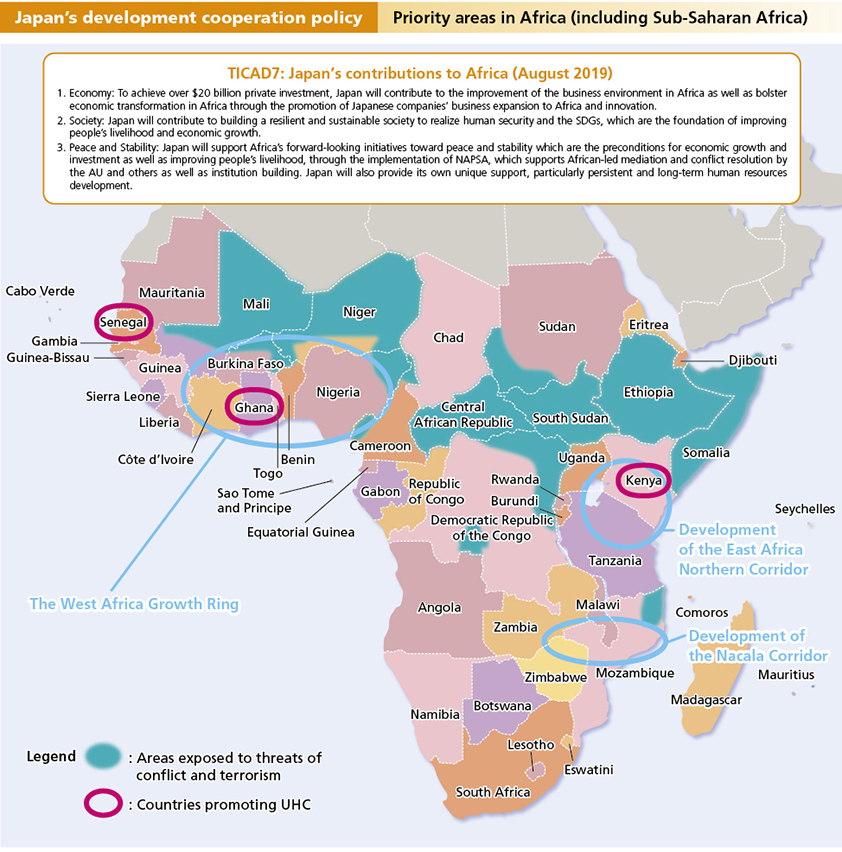
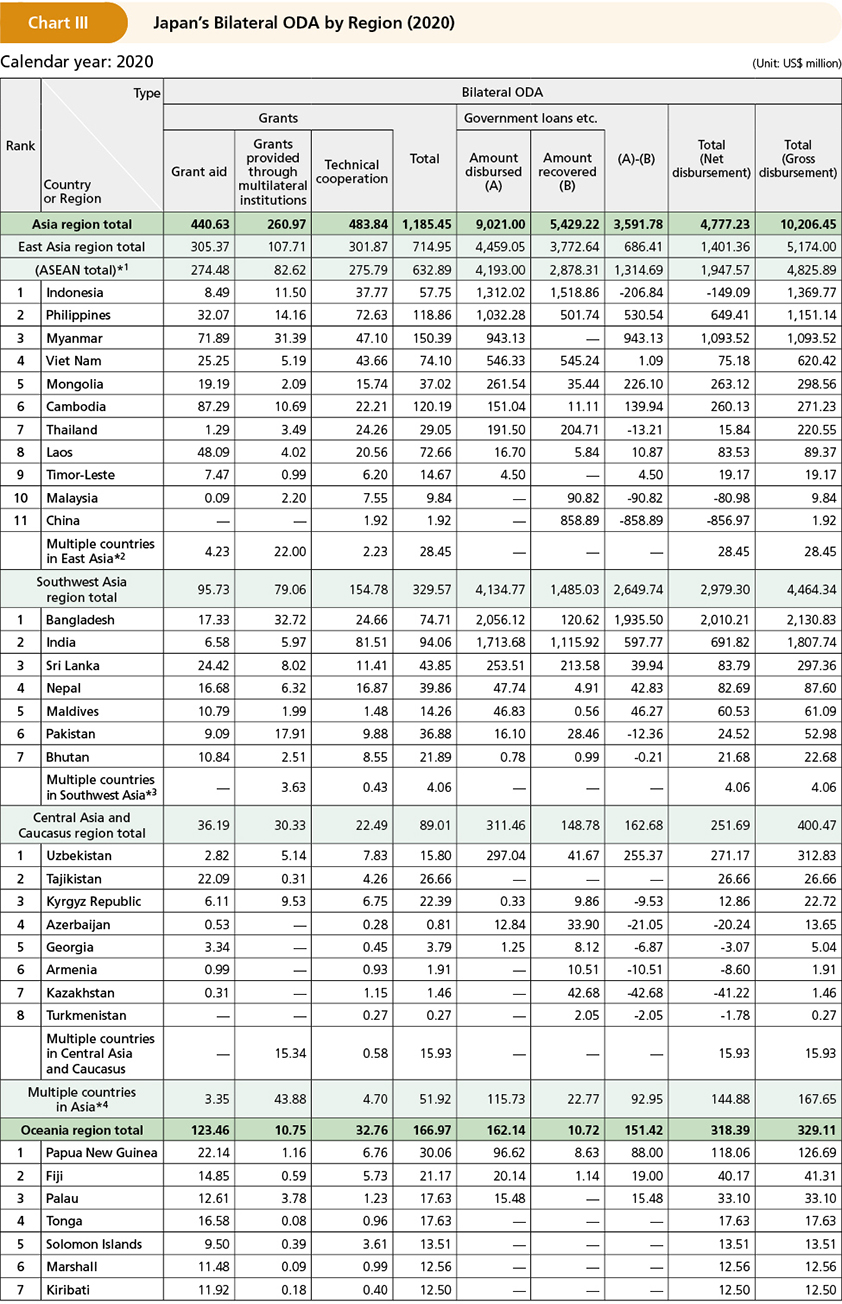
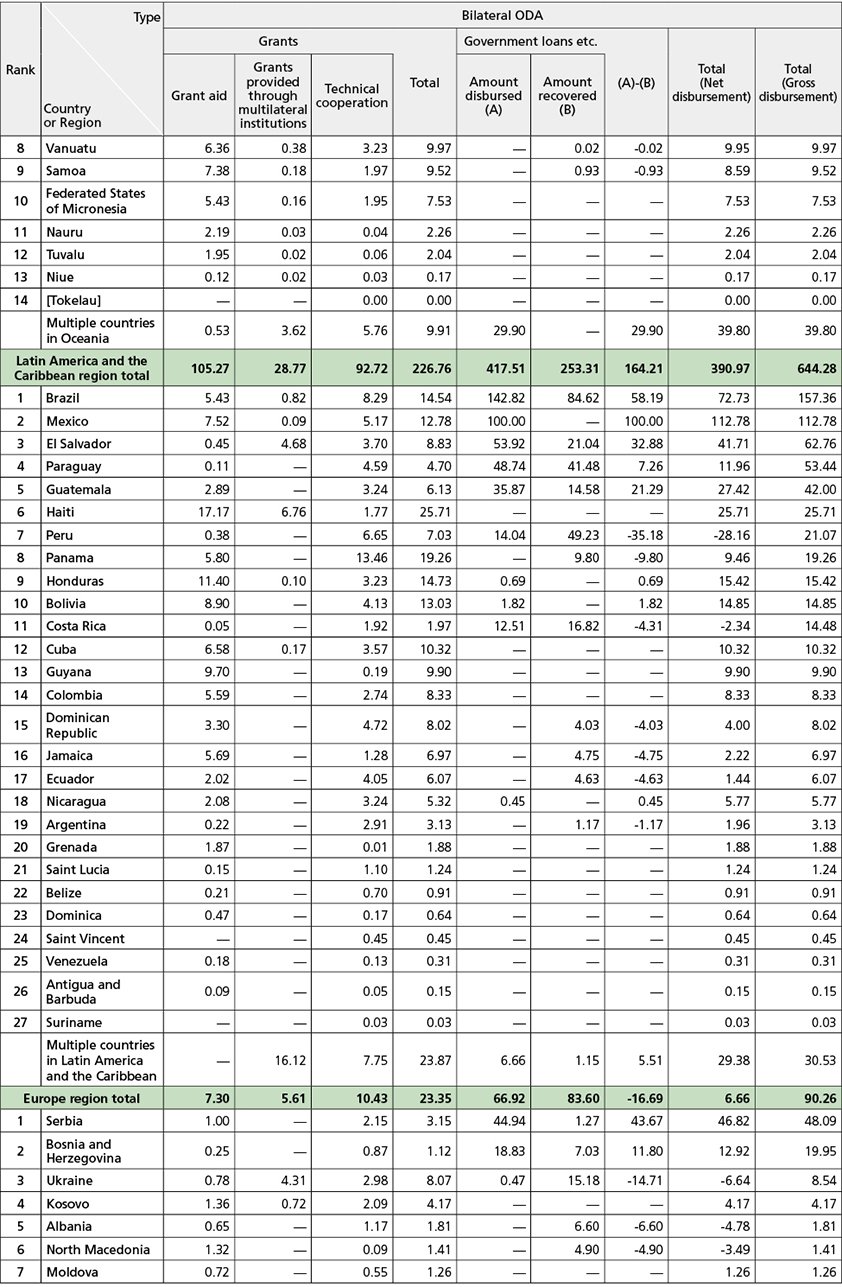
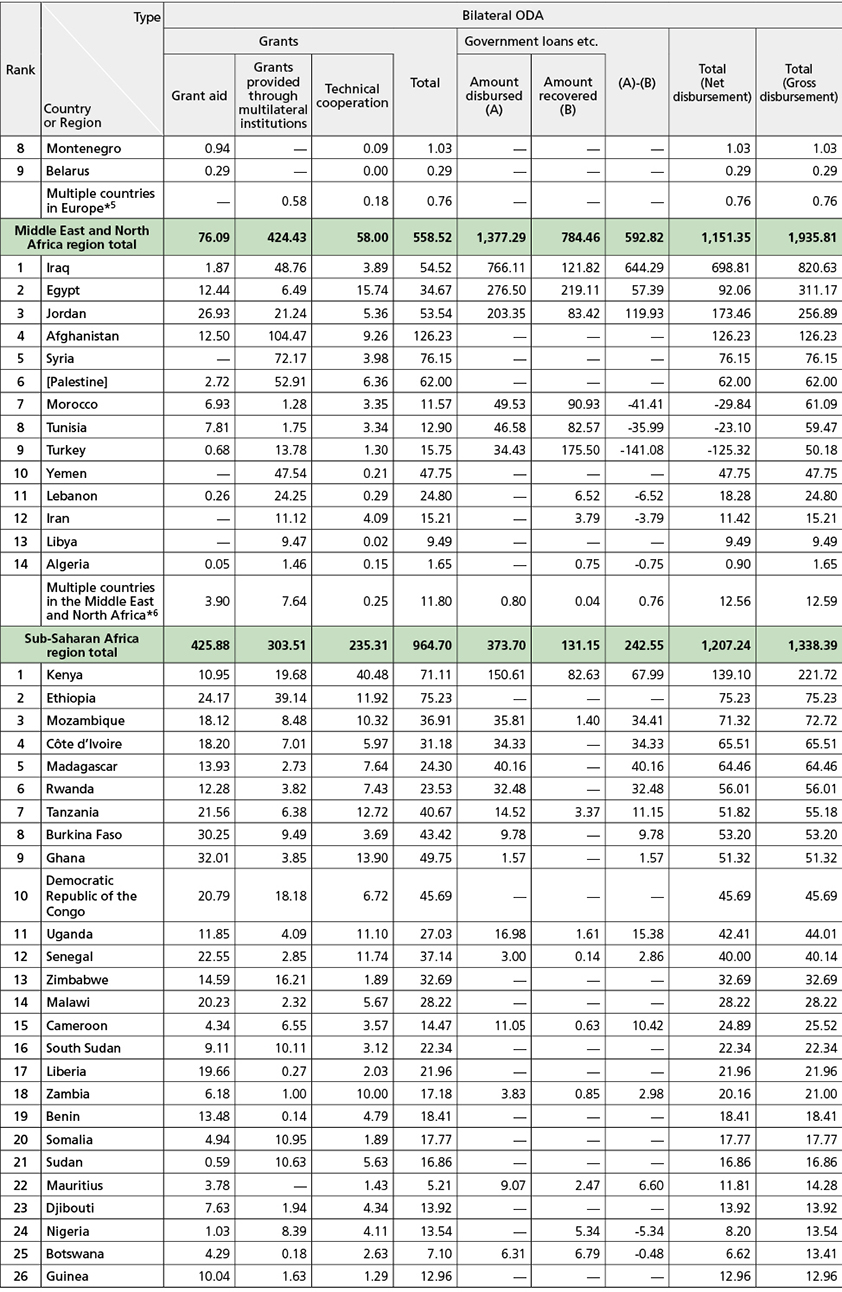
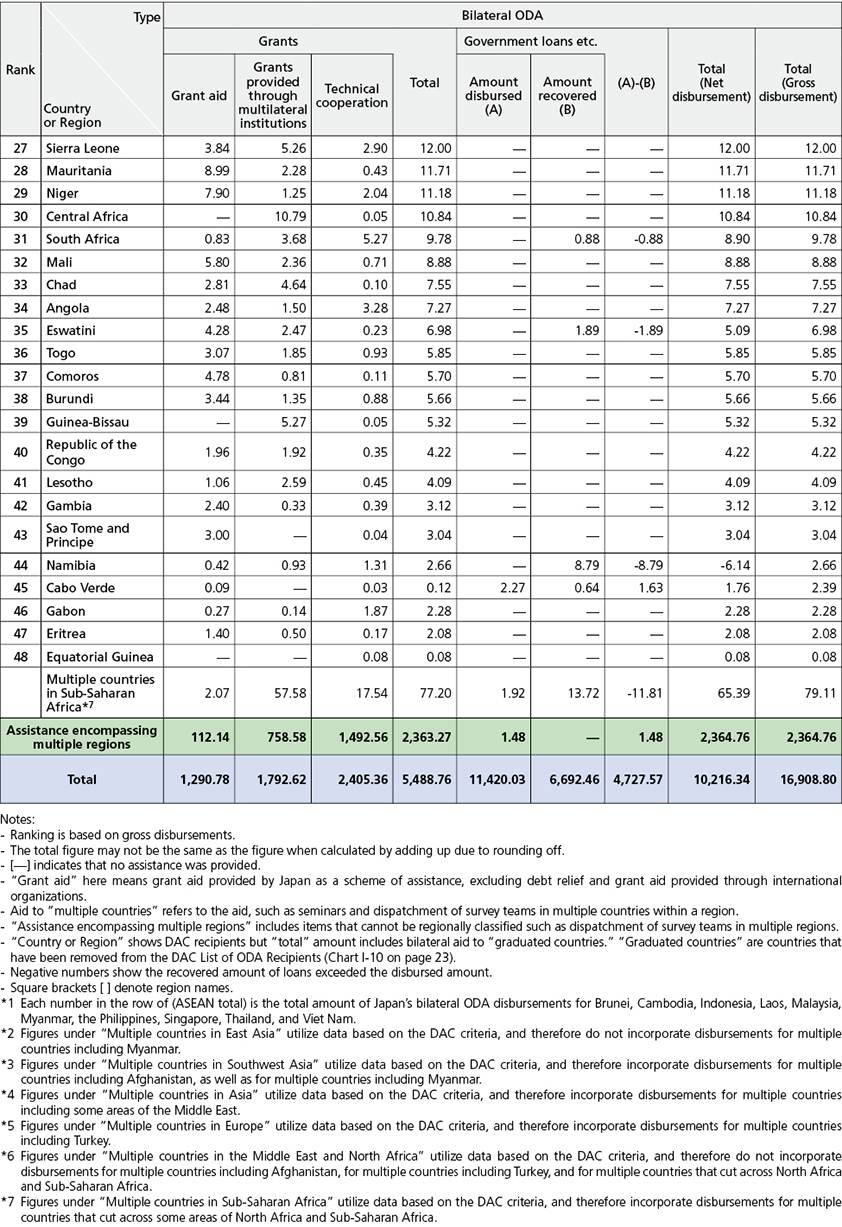
- Note 23: Adopted at the Ordinary Session of the Assembly of the African Union (AU) in 2015, the same year the 2030 Agenda for Sustainable Development was adopted.
- Note 24: See Note 2.
- Note 25: See the glossary.
- Note 26: Three areas spanning the East Africa Northern Corridor, the Nacala Corridor, and the West Africa Growth Ring.
